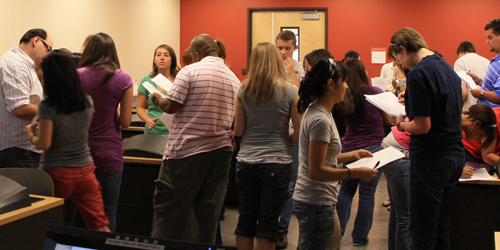 Just think what it would be like if you just moved to Las Vegas from Mexico, you’re in the 5th grade, you spoke very little English, and you just got admitted to a school where your only instruction is in English. This scenario is an all too common one for many of the 60,000 English learners identified in Clark County School District.
Just think what it would be like if you just moved to Las Vegas from Mexico, you’re in the 5th grade, you spoke very little English, and you just got admitted to a school where your only instruction is in English. This scenario is an all too common one for many of the 60,000 English learners identified in Clark County School District.
It is necessary for the significantly large number of English Learners in public schools to become proficient in the English language and literacy skills in order to achieve and excel in courses, in addition to successfully completing proficiency exams required by the District and No Child Left Behind. Therefore, it is critical that our pre-service and in-service teachers earn what is called a Teaching English as a Second Language (TESL) endorsement in order to effectively facilitate English language development in their K-12 students.
All teachers are English teachers regardless of what content one teaches, according to Dr. Lori Navarrete, Interim Dean of the School of Education. Reading and writing are necessary skills to have in order to learn subjects such as math, earth science, social studies etc. It is important that all teachers, primary and secondary, have knowledge and skills to effectively teach English learners, continued Dr. Navarrete.
English language learners (ELLs) come with a range of characteristics and experiences. Some come from other countries where they may not have attended school consistently in the last few years or at all as a result of needing to maintain a job to assist in supporting their family. Other ELLs may be second or third generation students in the U.S. who have not fully developed English language and literacy due to various factors that may include economic hardships experienced by their families, limited development of their first language before learning a second language, inconsistent schooling, disability, and/or poor English language models, to name a few.
Approximately two years ago, the School of Education collaborated with the CCSD English Language Learner Program (ELLP) to develop the TESL 4-in-1 Program where licensed CCSD teachers take 12 credits in TESL coursework at NSC in six months. They receive reimbursement for their tuition by the ELLP if they successfully complete the courses. Upon successful completion of the coursework, they apply for a TESL endorsement with the Nevada Department of Education and they are able to use the course credits toward their salary advancement. The courses are rigorous and relevant with context and strategies that can be applied the next day. The curriculum in the four courses is based on best practices and includes content in second language development and theories, methods of teaching English learners, developing curriculum for English learners, and assessing English language skills using formal and informal assessment.
Dr. Navarrete has worked closely with Tracy Clark and other directors in the ELLP to collaborate and extend this program. According to Tracy Clark, Director I of the ELLP, Title III professional development funds are used to reimburse teachers in the TESL 4-in-1 Program at NSC. With over 63,000 students in the Clark County School District speaking over 100 different languages, it is important that teachers have the tools necessary to teach language as well as content. Clark further stated, it has been a pleasure working with NSC to find the most meaningful and beneficial course content to support CCSD teachers.
Since 2008, over 150 teachers have benefited from the TESL 4-in-1 Program. It is anticipated that over 500 more teachers will participate in the TESL 4-in-1 Program by July 2010. It is the K-12 students who will benefit greatly from the new TESL skills learned and applied by their teachers.
The School of Education faculty and administrators saw the need to revise their elementary education degree to include an increased amount of TESL coursework back in 2007. The degree was revised and approved by the NSHE Board of Regents. The result is all undergraduate students earning a degree in elementary education will also be able to add a TESL endorsement to their license upon graduation. The endorsement coursework is a required component of the degree.
The aforementioned degree revision coupled with the TESL 4-in-1 Program are evidence of the School of Education’s commitment and response to effectively serving the diverse K-12 student population in southern Nevada and beyond.
Effectively Instruct English Language Learning CCSD Students
